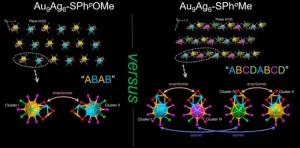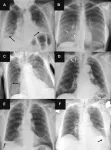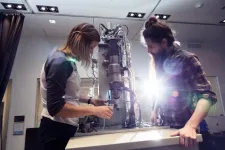(Press-News.org)
Redefining Global Health Security: A Novel Framework Sheds Light on Equity and Decolonial Approaches
Kuala Lumpur, Malaysia and London, UK – 25 September 2023
In the wake of the COVID-19 pandemic, a new policy paper titled "Global Health Security and the Health-Security Nexus: Principles, Politics and Praxis" in the journal BMJ Global Health, warns of dangers and potential pitfalls associated with the increased attention paid to ‘global health security’ and the growing interaction between public health and security actors.
According to the authors, the prevailing discourse on global health security is focused on infectious disease threats and the concerns of high-income populations and ignores crucial aspects of political, economic and food insecurity that largely affect low-income populations. To address these issues, the authors introduce two contrasting conceptualizations of health security: neo-colonial health security and universal health security.
Neo-colonial health security privileges the security of wealthier populations and countries, while typically identifying poor countries and populations as the threat source, usually via the vector of naturally occurring disease outbreaks.
According to lead author Professor David McCoy, “Neo-colonial health security focuses on the use of bio-security technologies including diagnostics, vaccines, and medicines. Universal health security is more inclusive of the needs of poorer populations and accommodates a broader range of threats to health, including poverty, hunger, poor access to healthcare and human rights abuses, whereby diseases and vulnerability to pandemics are viewed as an outcome of insecurity as much as a cause of insecurity”.
The paper also presents a novel heuristic framework comprised of five scenarios in which health and security agendas and actors intersect in different ways and argues that these intersections have remained largely unstudied.
"The evolving landscape of global health security necessitates a profound re-evaluation. This framework offers critical insights, shedding light on the intersections of health and security, as we navigate the complex path toward equity and decolonial approaches," said David McCoy.
The research also sounds an alarm about the growth of a 'security industrial complex' within which public health regimes may become rooted in bio-technological, coercive and authoritarian approaches to health security that threaten human rights and undermine efforts to combat inequality.
The Director of the United Nations University International Institute for Global Health, Rajat Khosla, further adds, "This paper raises concern about the potential for powerful corporate actors to dominate multi-billion-dollar health security budgets and highlights the need for transparency and close monitoring of the pandemic funds, treaties and medical countermeasures platforms that are being established."
The paper calls for more public debate about the evolving health-security landscape and the growing influence of security sector actors in global health.
This new analysis offers vital insights for policymakers, practitioners, and scholars in the field, signaling the need for a profound shift in global health security paradigms.
***
Read the Journal article via this link: https://gh.bmj.com/content/8/9/e013067.full
To cite: McCoy D, Roberts S, Daoudi S, et al. Global health security and the health-security nexus: principles, politics and praxis. BMJ Glob Health 2023;0:e013067. doi: 10.1136/ bmjgh-2023-013067
For media inquiries or interviews with the authors, please contact:
Gopi Kharel
Knowledge Management and Communications Manager
UNU- International Institute for Global Health
Email: gopi.kharel@unu.edu
Information and contact details of the authors
David McCoy, BMed, MPhil, DrPH
International Institute for Global Health, United Nations University, Kuala Lumpur, Malaysia
Email: mccoy@unu.edu
Stephen Roberts, MA, DPhil
UCL Institute for Global Health, University College London
Email: stephen.roberts@ucl.ac.uk
Salma Daoudi, MPhil
Somerville College, University of Oxford)
Email: salma.daoudi@some.ox.ac.uk
Jonathan Kennedy, MA, DPhil
Wolfson Institute of Population Health Sciences, Queen Mary University London
Email: j.kennedy@qmul.ac.uk
Note to Editors: High-resolution images and additional information about the authors are available upon request.
END
"Of all the subspecies of reindeer found in the high north, the Svalbard reindeer has the most inbreeding and the lowest genetic diversity," says Nicolas Dussex, a postdoc at Norwegian University of Science and Technology´s (NTNU) Department of Natural History.
It was only 7000-8000 years ago that the first reindeer migrated to Svalbard, most likely from Russia via Novaya Zemlya and the islands of Franz Josef Land. Perhaps there were no more than a few animals that established themselves on the arctic ...
HOUSTON – (Sept. 26, 2023) – The Advanced Research Projects Agency for Health (ARPA-H) has awarded $45 million to rapidly develop sense-and-respond implant technology that could slash U.S. cancer-related deaths by more than 50%.
The award to a Rice University-led team of researchers from seven states will fast-track development and testing of a new approach to cancer treatment that aims to dramatically improve immunotherapy outcomes for patients with ovarian, pancreatic and other difficult-to-treat cancers.
“Instead of tethering patients to hospital beds, IV bags and external monitors, ...
Metal nanoclusters are tiny, crystalline structures up to two nanometers (2 x 10-9 meters) in diameter that contain a few to hundreds of metal atoms. Understanding the precise assembly of metal nanoclusters is paramount to determining how different structures affect the properties and molecular interactions of these materials. Researchers recently synthesized two similar gold-silver (Au9Ag6) nanoclusters in a highly controlled manner to determine the precise atomic structure of each nanocluster and the effects of specific thiol ligands, or sulfur-containing binding molecules, on material synthesis.
Given their extremely small size, metal nanoclusters have ...
(Santa Barbara, Calif.) — What makes for a successful climate-resilient fishery, one that sustainably produces resources for human benefit despite increasing climate stressors and human impacts? It’s a question that faces present and future fisheries, their practitioners and fishing communities as the world turns to the ocean to feed its growing population.
“For a fishery to be resilient it needs to be able to prepare for, resist, cope with, recover from, or adapt to any given impact,” said Jacob Eurich, who is a research associate at UC Santa Barbara’s Marine Science Institute, and a fisheries scientist at the Environmental Defense Fund (EDF). “In ...
OAK BROOK, Ill. – In a study of more than 2,000 chest X-rays, radiologists outperformed AI in accurately identifying the presence and absence of three common lung diseases, according to a study published in Radiology, a journal of the Radiological Society of North America (RSNA).
“Chest radiography is a common diagnostic tool, but significant training and experience is required to interpret exams correctly,” said lead researcher Louis L. Plesner, M.D., resident radiologist and Ph.D. fellow in the Department of Radiology at Herlev and Gentofte Hospital in Copenhagen, Denmark.
While commercially available ...
SAN ANTONIO — September 26, 2023—Researchers from Southwest Research Institute (SwRI) and The University of Texas at San Antonio (UTSA) are developing techniques to detect traumatic brain injury (TBI) by analyzing breath for specific biomarkers. The project, led by SwRI’s Dr. Mark Libardoni and UTSA’s Dr. Marzieh Memar and Dr. Morteza Seidi, is supported by a $125,000 grant from the Connecting through Research Partnerships (Connect) program.
Breath analysis is performed by analyzing exhaled breath for specific biomarkers, such as metabolites, proteins and ...
A complete map of all the connections in an entire mammalian brain may be in sight. Allen Institute researchers have just launched three new projects to construct large, detailed maps of neuronal connections in sections of the mouse and macaque brains, with an eye toward creating full wiring diagrams of these animals’ brains in the future. These projects are funded by the National Institutes of Health’s Brain Research Through Advancing Innovative Neurotechnologies® (BRAIN) Initiative.
Allen Institute research teams ...
The MIT Press is delighted to announce that it has received a two-year, $275,000 Early-Concept Grant for Exploratory Research (EAGER) from the National Science Foundation to expand the shift+OPEN initiative and shift at least two more journals to diamond open access. The Press will also use the grant to assess and compare the viability of open access models for advancing and sustaining the outputs of scientific and scholarly STEM and HSS research.
“We’re grateful to the National Science Foundation for their support of our growing shift+OPEN program,” says Nick Lindsay, Director for Journals and Open Access for the MIT ...
Incorporating targeted food and nutrition strategies into healthcare on a national level will improve health and quality of life, reduce work for hospitals, and cut healthcare costs, according to experts studying Food is Medicine (FIM) efforts. The health and economic benefits of this approach are detailed in a report out today from researchers at the Food is Medicine Institute at the Friedman School of Nutrition Science and Policy at Tufts University, through support from The Rockefeller Foundation.
The True Cost of Food: Food is Medicine Case Study quantifies the potential health and economic benefits of FIM efforts, which refer to food-based nutrition ...
PASADENA, CA — September 26, 2023 — The Giant Magellan Telescope begins the four-year process to fabricate and polish its seventh and final primary mirror, the last required to complete the telescope’s 368 square meter light collecting surface, the world’s largest and most challenging optics ever produced. Together, the mirrors will collect more light than any other telescope in existence, allowing humanity to unlock the secrets of the Universe by providing detailed chemical analyses of celestial objects and their origin.
Last week, the University of Arizona Richard F. Caris Mirror Lab closed the lid on nearly 20 tons of the ...








